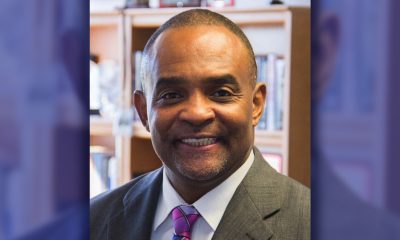Business
Pressure Builds for Feds to ‘Ban the Box’
By Freddie Allen
NNPA Senior Washington Correspondent
WASHINGTON (NNPA) – Seventeen states and Washington, D.C. have passed laws making it easier for ex-offenders to find jobs in the labor market. Now civil rights and community groups that advocate for returning citizens are pushing the White House to do the same.
Even though politicians on both sides of the aisle have warmed up to criminal justice reform and smarter sentencing policies, an estimated 70 million adults in the United States have arrests or conviction records and 9 in 10 employers conduct criminal background checks, according to a report by the National Employment Law Project (NELP), a workers’ rights group.
The Sentencing Project, a group that has advocated for criminal justice reform nearly 30 years, called the United States “the world’s leader incarceration with 2.2 million people currently in the nation’s prisons or jails – a 500% increase over the past thirty years.”
Blacks, who are nearly 13 percent of the U.S. population, account for 35.7 percent of state and federal prison population, compared to Whites who make up 32.8 percent.
“Our justice system is deeply unjust and unfair,” said Wade Henderson, the president and CEO of the Leadership Conference on Civil and Human Rights, a coalition of more than 200 national civil rights groups. “We often focus on the incarceration rate and the impact that policing and sentencing have on communities of color, but the injustice of our system is much more widespread.”
That’s because the United States continues to punish people long after they have paid their debts to society, said Henderson.
Most people who are convicted of crimes return to their communities, often facing greater challenges to finding affordable housing, educational opportunities and jobs.
“These barriers make it incredibly difficult for people to rebuild their lives and become the contributing members of society that we want them to be,” said Henderson. “As a result, millions of people are being left behind and left out.”
When those workers are left out, the economy suffers.
“Economists estimated that because people with felony records and formerly incarcerated people have poor job prospects, the nation’s gross domestic product in 2008 was between $57 and $65 billion lower than it would have been had they been gainfully employed,” stated the National Employment Law Project (NELP) report.
“Federal action is what’s right and is what’s needed as a matter of fairness, but without addressing the employment needs of the massive numbers of people with records who are locked out of the labor market, the economy suffers as well,” said Maurice Emsellem, the program director for NELP. “Especially in communities like Baltimore and elsewhere ravaged by criminal justice system.”
Some of the biggest companies in the United States are taking notice and revising their hiring policies to provide greater opportunities to ex-offenders.
KOCH Industries, worth more than $100 billion, recently joined Wal-Mart, Target and Home Depot to “ban the box” on job applications.
According to the NELP, “There are a total of 17 states representing nearly every region of the country that have adopted the policies —California (2013, 2010), Colorado (2012), Connecticut (2010), Delaware (2014), Georgia (2015), Hawaii (1998), Illinois (2014, 2013), Maryland (2013), Massachusetts (2010), Minnesota (2013, 2009), Nebraska (2014), New Jersey (2014), New Mexico (2010), Ohio (2015), Rhode Island (2013), Vermont (2015), and Virginia (2015).”
Six states have required that private employers remove the question about criminal background from job applications.
“These companies and states are seeing what the federal government hasn’t – that fair chance hiring isn’t just good for communities, it’s good for our economy,” said Henderson. “Certainly those industries would not adopt policies that hurt their bottom line and if they can show the kind of leadership, civic engagement and commitment to fair play in the workforce, then surely the federal government can follow behind.”
Andrea Marta, the campaign manager for Lifelines to Healing, an initiative of the PICO National Network, said that finding a job is the key to helping people return to their communities.
“Jobs help provide redemption and the second chance that many of our folks need to be successful once they come home,” said Marta. “People can walk away from the cycle of violence and poverty through a job that can prevent it.”
Dorsey Nunn, the executive director Legal Services for Prisoners with Children and the co-founder All of Us or None, said that it’s a contradiction to say that citizens can return to their communities after serving their citizens while depriving them of the rights and resources needed to get ahead.
Earlier this month, a group from PICO National Network that included ex-offenders met with White House officials and staffers from the Congressional Black Caucus to talk about recommendations for returning citizens facing employment and housing barriers.
Akim Lattermore, a community leader with the Ohio Organizing Collaborative said in a statement, “You can’t resolve policy issues surrounding fair hiring and the formerly incarcerated unless you have those impacted in the room.”
Emsellem said that “Ban the Box” legislation is also in compliance with current civil rights laws that require employers to take into account the age of the record directly related to job or rehabilitation programs that the applicant has completed.
In 2012, the Equal Employment Opportunity Commission (EEOC) released guidance on hiring practices, encouraging companies to be more mindful of how they use an applicant’s criminal background history in judging whether they’re qualified to do the job because they might unintentionally violate Title VII of the Civil Rights Act of 1964.
Emsellem said that the beauty of “ban the box” policies is their ability to isolate an applicant’s past criminal record, because those questions come at the end of the hiring process, after the employer has made every other decision. So it’s clear that the employer is judging the potential employee based on his ability or prior conviction.
Emsellem continued, “That creates a real opening and makes it way easier to argue these legal issues and puts the employer, honestly, in a really tough spot.”
Nunn said that if the federal government is going to spend his tax dollars, then he should have access to everything that they spend his money on. That includes jobs with companies that do business with and for the federal government.
“There are boxes all over the place that exclude me from access to a meaningful life,” Nunn said. “’Ban the box’ is more than a question of fair chance hiring. I want the full restoration of my civil and human rights and this is just the first step in the process.”
Bay Area
State Controller Malia Cohen Keynote Speaker at S.F. Wealth Conference
California State Controller Malia Cohen delivered the keynote speech to over 50 business women at the Black Wealth Brunch held on March 28 at the War Memorial and Performing Arts Center at 301 Van Ness Ave. in San Francisco. The Enterprising Women Networking SF Chapter of the American Business Women’s Association (ABWA) hosted the Green Room event to launch its platform designed to close the racial wealth gap in Black and Brown communities.

By Carla Thomas
California State Controller Malia Cohen delivered the keynote speech to over 50 business women at the Black Wealth Brunch held on March 28 at the War Memorial and Performing Arts Center at 301 Van Ness Ave. in San Francisco.
The Enterprising Women Networking SF Chapter of the American Business Women’s Association (ABWA) hosted the Green Room event to launch its platform designed to close the racial wealth gap in Black and Brown communities.
“Our goal is to educate Black and Brown families in the masses about financial wellness, wealth building, and how to protect and preserve wealth,” said ABWA San Francisco Chapter President LaRonda Smith.
ABWA’s mission is to bring together businesswomen of diverse occupations and provide opportunities for them to help themselves and others grow personally and professionally through leadership, education, networking support, and national recognition.
“This day is about recognizing influential women, hearing from an accomplished woman as our keynote speaker and allowing women to come together as powerful people,” said ABWA SF Chapter Vice President Velma Landers.
More than 60 attendees dined on the culinary delights of Chef Sharon Lee of The Spot catering, which included a full soul food brunch of skewered shrimp, chicken, blackened salmon, and mac and cheese.
Cohen discussed the many economic disparities women and people of color face. From pay equity to financial literacy, Cohen shared not only statistics, but was excited about a new solution in motion which entailed partnering with Californians for Financial Education.
“I want everyone to reach their full potential,” she said. “Just a few weeks ago in Sacramento, I partnered with an organization, Californians for Financial Education.
“We gathered 990 signatures and submitted it to the [California] Secretary of State to get an initiative on the ballot that guarantees personal finance courses for every public school kid in the state of California.
“Every California student deserves an equal opportunity to learn about filing taxes, interest rates, budgets, and understanding the impact of credit scores. The way we begin to do that is to teach it,” Cohen said.
By equipping students with information, Cohen hopes to close the financial wealth gap, and give everyone an opportunity to reach their full financial potential. “They have to first be equipped with the information and education is the key. Then all we need are opportunities to step into spaces and places of power.”
Cohen went on to share that in her own upbringing, she was not guided on financial principles that could jump start her finances. “Communities of color don’t have the same information and I don’t know about you, but I did not grow up listening to my parents discussing their assets, their investments, and diversifying their portfolio. This is the kind of nomenclature and language we are trying to introduce to our future generations so we can pivot from a life of poverty so we can pivot away and never return to poverty.”
Cohen urged audience members to pass the initiative on the November 2024 ballot.
“When we come together as women, uplift women, and support women, we all win. By networking and learning together, we can continue to build generational wealth,” said Landers. “Passing a powerful initiative will ensure the next generation of California students will be empowered to make more informed financial decisions, decisions that will last them a lifetime.”
Business
Black Business Summit Focuses on Equity, Access and Data
The California African American Chamber of Commerce hosted its second annual “State of the California African American Economy Summit,” with the aim of bolstering Black economic influence through education and fellowship. Held Jan. 24 to Jan. 25 at the Westin Los Angeles Airport Hotel, the convention brought together some of the most influential Black business leaders, policy makers and economic thinkers in the state. The discussions focused on a wide range of economic topics pertinent to California’s African American business community, including policy, government contracts, and equity, and more.

By Solomon O. Smith, California Black Media
The California African American Chamber of Commerce hosted its second annual “State of the California African American Economy Summit,” with the aim of bolstering Black economic influence through education and fellowship.
Held Jan. 24 to Jan. 25 at the Westin Los Angeles Airport Hotel, the convention brought together some of the most influential Black business leaders, policy makers and economic thinkers in the state. The discussions focused on a wide range of economic topics pertinent to California’s African American business community, including policy, government contracts, and equity, and more.
Toks Omishakin, Secretary of the California State Transportation Agency (CALSTA) was a guest at the event. He told attendees about his department’s efforts to increase access for Black business owners.
“One thing I’m taking away from this for sure is we’re going to have to do a better job of connecting through your chambers of all these opportunities of billions of dollars that are coming down the pike. I’m honestly disappointed that people don’t know, so we’ll do better,” said Omishakin.
Lueathel Seawood, the president of the African American Chamber of Commerce of San Joaquin County, expressed frustration with obtaining federal contracts for small businesses, and completing the process. She observed that once a small business was certified as DBE, a Disadvantaged Business Enterprises, there was little help getting to the next step.
Omishakin admitted there is more work to be done to help them complete the process and include them in upcoming projects. However, the high-speed rail system expansion by the California High-Speed Rail Authority has set a goal of 30% participation from small businesses — only 10 percent is set aside for DBE.
The importance of Diversity, Equity and Inclusion (DEI) in economics was reinforced during the “State of the California Economy” talk led by author and economist Julianne Malveaux, and Anthony Asadullah Samad, Executive Director of the Mervyn Dymally African American Political and Economic Institute (MDAAPEI) at California State University, Dominguez Hills.
Assaults on DEI disproportionately affect women of color and Black women, according to Malveaux. When asked what role the loss of DEI might serve in economics, she suggested a more sinister purpose.
“The genesis of all this is anti-blackness. So, your question about how this fits into the economy is economic exclusion, that essentially has been promoted as public policy,” said Malveaux.
The most anticipated speaker at the event was Janice Bryant Howroyd known affectionately to her peers as “JBH.” She is one of the first Black women to run and own a multi-billion-dollar company. Her company ActOne Group, is one of the largest, and most recognized, hiring, staffing and human resources firms in the world. She is the author of “Acting Up” and has a profile on Forbes.
Chairman of the board of directors of the California African American Chamber of Commerce, Timothy Alan Simon, a lawyer and the first Black Appointments Secretary in the Office of the Governor of California, moderated. They discussed the state of Black entrepreneurship in the country and Howroyd gave advice to other business owners.
“We look to inspire and educate,” said Howroyd. “Inspiration is great but when I’ve got people’s attention, I want to teach them something.”
Activism
Oakland Post: Week of April 17 – 23, 2024
The printed Weekly Edition of the Oakland Post: Week of April 17 – 23, 2024

To enlarge your view of this issue, use the slider, magnifying glass icon or full page icon in the lower right corner of the browser window. ![]()
-

 Activism4 weeks ago
Activism4 weeks agoOakland Post: Week of March 27 – April 2, 2024
-

 #NNPA BlackPress4 weeks ago
#NNPA BlackPress4 weeks agoCOMMENTARY: D.C. Crime Bill Fails to Address Root Causes of Violence and Incarceration
-

 #NNPA BlackPress4 weeks ago
#NNPA BlackPress4 weeks agoFrom Raids to Revelations: The Dark Turn in Sean ‘Diddy’ Combs’ Saga
-

 #NNPA BlackPress4 weeks ago
#NNPA BlackPress4 weeks agoCOMMENTARY: Lady Day and The Lights!
-

 #NNPA BlackPress4 weeks ago
#NNPA BlackPress4 weeks agoMayor, City Council President React to May 31 Closing of Birmingham-Southern College
-

 #NNPA BlackPress4 weeks ago
#NNPA BlackPress4 weeks agoBaltimore Key Bridge Catastrophe: A City’s Heartbreak and a Nation’s Alarm
-

 #NNPA BlackPress4 weeks ago
#NNPA BlackPress4 weeks agoBaltimore’s Key Bridge Struck by Ship, Collapses into Water
-

 #NNPA BlackPress4 weeks ago
#NNPA BlackPress4 weeks agoBeloved Actor and Activist Louis Cameron Gossett Jr. Dies at 87
















































